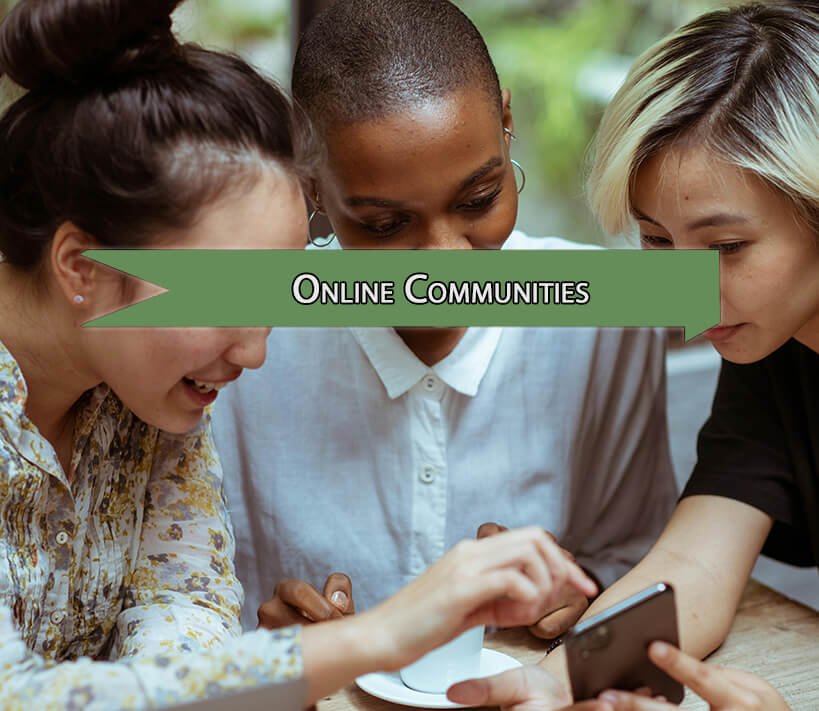Online Communities are like second homes, filled with people who share their interests, struggles, and goals. Whether it is a Facebook support group, an Instagram community, or a Discord server for creative minds, these spaces offer encouragement, information, emotional support, and even lasting friendships. But like any environment, they also come with their emotional dynamics and challenges. Spending time in online community can uplift your mood and foster a sense of belonging, if you use them mindfully. On the flip side, without careful navigation, they can also become overwhelming and emotionally draining.
In this blog, we will explore how to maintain our mental well-being while engaging with online communities.
1. Be Honest about Why You are There
One of the healthiest things you can do is identify the reason why you are joining or participating in an online community. Are you genuinely seeking support? Hoping to share your experience? Looking for distraction or validation? When you are aware of your emotional motivation, it helps you stay grounded and intentional. It becomes easier to walk away when you feel that the community no longer serves your purpose. This kind of self-check protects you from unnecessary emotional entanglement, a common issue in large online communities where emotions often run high. At Psychoaura, we encourage this mindful approach to ensure that your online interactions support your mental well-being rather than strain it.
2. Limit Your Emotional Labor
While online communities can be incredibly supportive, they also require emotional energy, especially for those who are naturally inclined to help others. It is perfectly OK for every comment not to be replied to, and it is equally OK to express that space is being held for oneself at the moment. One can still be considered a valuable part of the community without exhausting their emotional reserves. Digital empathy should be practiced, but digital boundaries must be set to ensure emotional balance. At times, silent support is just as meaningful, and personal well-being should always be prioritized and safeguarded in every interaction.
3. Follow Communities that Align with Your Values
Not all online communities are created the same. Some foster toxic positivity, others thrive on negativity, while a few strike a healthy balance between empathy and accountability. Before committing to active participation, take some time to observe the discussions. Are the members respectful? Are the moderators actively working to maintain a safe space? If you are dealing with anxiety and depression, choose communities that talk about mental health with responsibility, where your trauma is not turned into a competition. Look for spaces that genuinely encourage healing and personal growth. Taking time to lurk and observe before jumping in can give you a much clearer idea of whether it is a healthy and supportive environment for you.
4. Mute, Block, Leave, No Guilt Needed
It is easy to forget that just because an online community exists, it does not mean you are obligated to stay in it. If a specific thread or member triggers you, use the available tools: mute the conversation, block the person, or leave the group altogether. Your mental health is not negotiable. You do not need to explain your departure or feel guilty about taking space. The ability to walk away is one of the most powerful and underrated acts of self-care in digital life.
5. Create a Positive Routine around Your Engagement
Instead of randomly checking online communities throughout the day, try designing international time slots to engage with them. A morning check-in or an evening stroll can become comforting rituals, especially when followed by something grounding, like Journaling, going for a walk, or meditating. Avoid mindlessly bouncing between apps, as this behavior tends to increase anxiety and lead to attention fatigue. Treat your community interactions as meaningful engagements, not just as something to fill with. Being intentional helps you stay present and ensures that your time online supports your well-being rather than draining it.
6. Remember the Power of Logging Off
If you find yourself constantly comparing your progress to others, feeling inadequate, or mentally drained after scrolling through social media, it is a sign to step back. Your worth cannot be measured by the likes and comments you receive in an online community. Sometimes, the healthiest choice is to temporarily disconnect from others. A short digital detox can help you reflect on your emotional needs and allow you to return with a healthier, more balanced mindset.
Conclusion
Online Communities can be powerful spaces for connection, inspiration, and support, but only when approached with intention and self-awareness. By being honest about your reasons for joining, setting clear emotional boundaries, selecting the right spaces, and knowing when to log off, you can protect your mental health while still enjoying the benefits of a digital community. Remember, your well-being should always come first. At Psychoaura, we believe that meaningful online engagement begins with mindful participation. So please take what you need, give what you can, and do not hesitate to step back when your inner peace calls for it.




